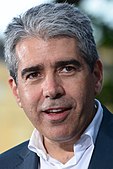
Back Eleccions generals espanyoles de 2016 Catalan Parlamentní volby ve Španělsku 2016 Czech Parlamentsvalget i Spanien 2016 Danish Parlamentswahl in Spanien 2016 German Ισπανικές γενικές εκλογές 2016 Greek Elecciones generales de España de 2016 Spanish 2016ko Espainiako hauteskunde orokorrak Basque انتخابات سراسری اسپانیا (۲۰۱۶) Persian Espanjan parlamenttivaalit 2016 Finnish Élections générales espagnoles de 2016 French
| |||||||||||||||||||||||||||||||||||||||||||||||||||||||||||||||||||||||||||||||||||||||||||||||||||||
All 350 seats in the Congress of Deputies and 208 (of 266) seats in the Senate 176 seats needed for a majority in the Congress of Deputies | |||||||||||||||||||||||||||||||||||||||||||||||||||||||||||||||||||||||||||||||||||||||||||||||||||||
|---|---|---|---|---|---|---|---|---|---|---|---|---|---|---|---|---|---|---|---|---|---|---|---|---|---|---|---|---|---|---|---|---|---|---|---|---|---|---|---|---|---|---|---|---|---|---|---|---|---|---|---|---|---|---|---|---|---|---|---|---|---|---|---|---|---|---|---|---|---|---|---|---|---|---|---|---|---|---|---|---|---|---|---|---|---|---|---|---|---|---|---|---|---|---|---|---|---|---|---|---|---|
| Opinion polls | |||||||||||||||||||||||||||||||||||||||||||||||||||||||||||||||||||||||||||||||||||||||||||||||||||||
| Registered | 36,520,913 | ||||||||||||||||||||||||||||||||||||||||||||||||||||||||||||||||||||||||||||||||||||||||||||||||||||
| Turnout | 24,279,259 (66.5%) | ||||||||||||||||||||||||||||||||||||||||||||||||||||||||||||||||||||||||||||||||||||||||||||||||||||
| |||||||||||||||||||||||||||||||||||||||||||||||||||||||||||||||||||||||||||||||||||||||||||||||||||||
| |||||||||||||||||||||||||||||||||||||||||||||||||||||||||||||||||||||||||||||||||||||||||||||||||||||
The 2016 Spanish general election was held on Sunday, 26 June 2016, to elect the 12th Cortes Generales of the Kingdom of Spain. All 350 seats in the Congress of Deputies were up for election, as well as 208 of 266 seats in the Senate.
No party had secured a majority in the 2015 election, resulting in the most fragmented parliament since 1977. Ensuing negotiations failed to produce a stable governing coalition, paving the way for a repeat election on 26 June.[1][2] The political deadlock marked the first time that a Spanish election was triggered due to failure in the government formation process.[3] Podemos and United Left (IU) joined forces ahead the election to form the Unidos Podemos alliance, along with several other minor left-wing parties. Opinion polling going into the election predicted a growing polarisation between this alliance and the People's Party (PP), which would be fighting to maintain first place nationally.[4]
The Unidos Podemos alliance suffered a surprise decline in votes and vote share compared to the previous election, while the PP increased its number of votes and seats as well as its margin of victory. The Spanish Socialist Workers' Party (PSOE) clung to second place despite losing votes and seats, scoring a new historical low. Albert Rivera's Citizens (C's) suffered from the electoral system as well as from tactical voting to the PP and fell to 32 seats. Overall, a potential PP–C's bloc secured 6 more seats than before, but remained short of an overall majority. With the political deadlock settling in, commentators suggested that a new, third election could be eventually needed.[5]
Electoral setbacks for the PSOE in the Basque and Galician regional elections held on 25 September 2016 unleashed a party crisis which led to Pedro Sánchez's ouster as leader on 1 October. An interim party leadership was appointed, which chose to abstain to allow government formation and prevent a third general election. As a result, Mariano Rajoy was re-elected as prime minister for a second term in office on 29 October amid public outcry and protest at PSOE's U-turn, which was also met with opposition from within the party—15 MPs eventually not complying with the party's directive and voting against Rajoy nonetheless.[6][7] Rajoy's government would only last for 20 months until 2018, as public outcry at the emergence of new corruption scandals and judicial blows to the ruling party would prompt Sánchez—who would secure re-election as PSOE leader in June 2017—to bring down the PP government in the first successful motion of no confidence since the Spanish transition to democracy.
Cite error: There are <ref group=lower-alpha> tags or {{efn}} templates on this page, but the references will not show without a {{reflist|group=lower-alpha}} template or {{notelist}} template (see the help page).
- ^ "Pedro Sánchez: "Estamos abocados a nuevas elecciones"". eldiario.es (in Spanish). 26 April 2016. Retrieved 26 April 2016.
- ^ "El Rey no propone a ningún candidato y aboca a nuevas elecciones en junio". El País (in Spanish). 26 April 2016.
- ^ "España, abocada a repetir elecciones por primera vez". El País (in Spanish). 26 April 2016. Retrieved 26 April 2016.
- ^ "El tsunami de Podemos ahoga a Sánchez y deja a Rajoy con el agua al cuello". El Confidencial (in Spanish). 10 June 2016. Retrieved 10 June 2016.
- ^ "España se encarrila hacia las terceras elecciones o hacia el limbo político tras el no de CDC, PNV y ERC a Rajoy". La Vanguardia (in Spanish). 27 July 2016. Retrieved 27 July 2016.
- ^ "Rajoy, investido presidente del Gobierno con 15 noes del PSOE". ABC (in Spanish). 29 October 2016. Retrieved 29 October 2016.
- ^ "Miles de manifestantes en la protesta contra la investidura de Rajoy". El País (in Spanish). 29 October 2016. Retrieved 29 October 2016.








